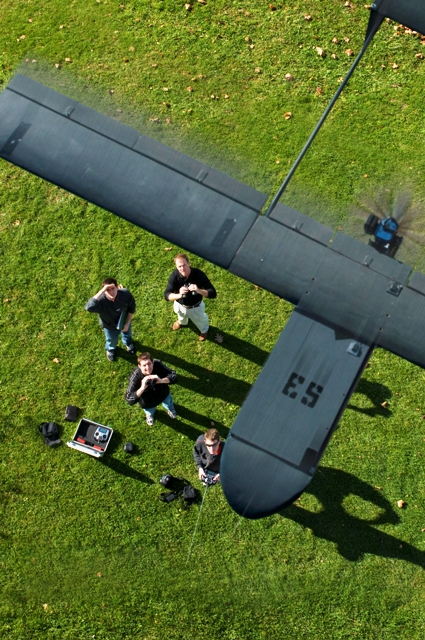
Virginia Tech’s College of Agriculture and Life Sciences and the College of Engineering recently celebrated the opening of a shared laboratory that will be key to developing advanced technology for unmanned aerial and underwater vehicles.
The Kentland Experimental Aerial Systems Laboratory provides 2,000-square-feet of space for students and faculty members in both colleges to conduct research that will examine everything from the spread of airborne plant pathogens to the creation of more high-tech submarines. The lab will also be used to educate and train the next generation of agricultural scientists and engineers.
David Schmale, associate professor in the Department of Plant Pathology, Physiology, and Weed Science in the College of Agriculture and Life Sciences, leads a team that has developed small, unmanned aerial vehicles that sample microbes far above the Earth’s surface. Some of these microbes have the potential to cause devastating plant diseases.
“An increased understanding of the dynamics of plant pathogens in the atmosphere is essential for establishing effective quarantine measures and mitigating potentially damaging events targeted at our nation’s agriculture and food supply,” Schmale said.
Craig Woolsey, associate professor and assistant department head for graduate studies in the College of Engineering, leads a team of researchers who work to improve the maneuverability and reliability of underwater vehicles.
“Suppose an unmanned, untethered submarine could be sent out to sea on its own to track the boundaries of El Nino. Such vehicles would have to use advanced control devices to perceive and respond appropriately to threats to their own safety, and more importantly, the safety of people and property,” Woolsey said.
The new lab allows Schmale, Woolsey, and other researchers at Virginia Tech to investigate the increasing use of unmanned vehicles. How the military utilizes unmanned aerial vehicles for intelligence and surveillance is well documented, but recently proposed applications include land management, search and rescue, border security, disaster support, and crop biosecurity.
University officials at the dedication also credited Dwight Paulette, college farm coordinator, for supervising the building of the laboratory that is adjacent to a paved airstrip at Kentland Farm. The following entities within Virginia Tech funded the $212,000 laboratory:
- College of Agriculture and Life Sciences;
- Department of Plant Pathology, Physiology, and Weed Science;
- College of Engineering;
- Department of Aerospace and Ocean Engineering;
- Department of Mechanical Engineering;
- The Institute for Critical Technology and Applied Science;
- The Office of the Vice President for Research; and
- Virginia Center for Autonomous Systems.
“The laboratory provides the opportunity for the colleges to strengthen their collaborative research efforts, and opens up opportunities for future funding,” said Saied Mostaghimi, the Elizabeth F. Alphin professor and associate dean for research and graduate studies in the College of Agriculture and Life Sciences.


